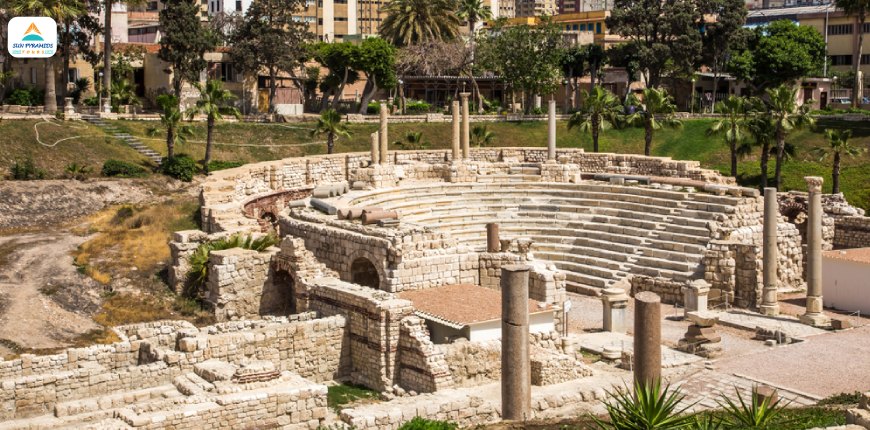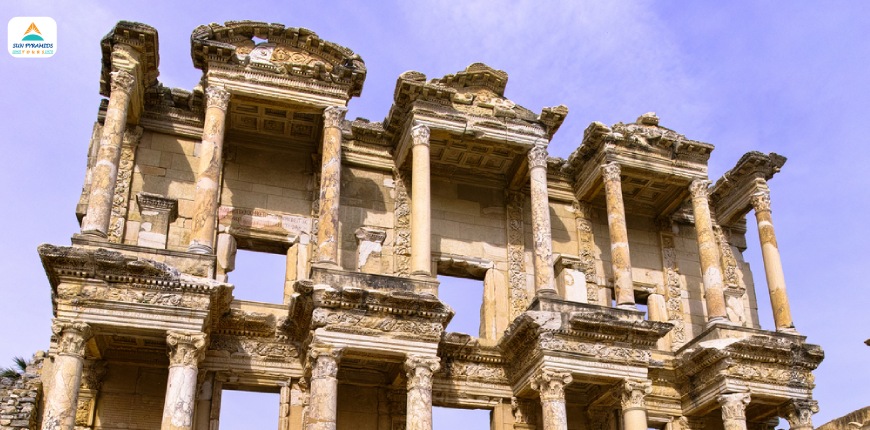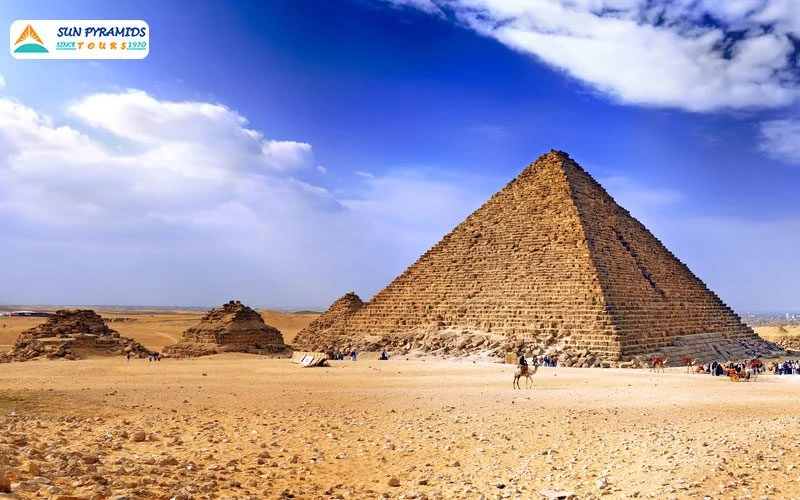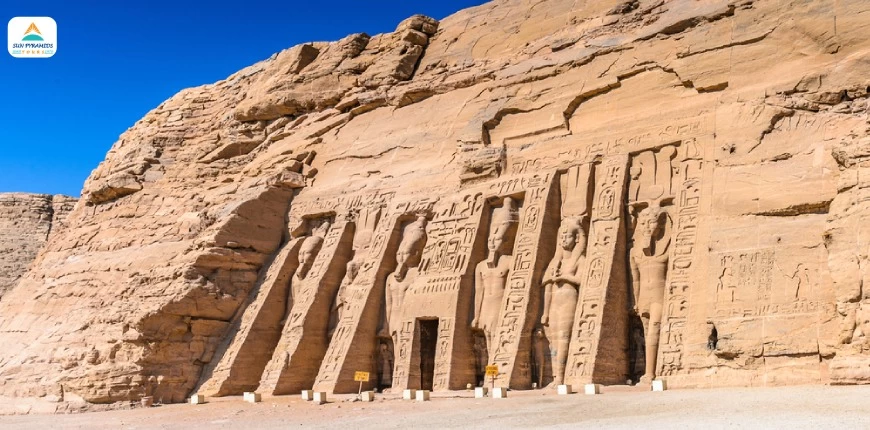Alexandria City: A Tapestry of History and Culture Awaits
Table of Content
Alexandria City History
Foundation and Medieval growth
Alexandria City At Roman and Byzantine periods
Alexandria in Islamic period
Evolution of the modern city
Conclusion
Why do I book with Sun Pyramids Tours
Alexandria City: A Tapestry of History and Culture Awaits

Alexandria City History
Alexandria, a city steeped in history and mystique, has long held a prominent place in the development of religious and philosophical thought. From its early days as a center of Hellenistic culture to its later role as a crucible for religious and intellectual exchange, Alexandria has left an indelible mark on global beliefs. This article explores the city's profound influence on Hellenism, Judaism, early Christianity, and Islam, shedding light on its enigmatic legacy.
Sun Pyramids Tours, 1970, the most innovative travel agency in Egypt, is inviting you to visit Alexandria and promising you an unforgettable Christian Monuments exploration to the most sacred and spiritual places all over Egypt. Contact us now, or Continue the article to find more helpful knowledge and packages.
Before we delve into the depths of Alexandrian history, it must be noted that this article is not meant to be a narration of ordinary historical events that take place on the coasts of this Mediterranean city. And if you notice that at the beginning of the article, you must know that this historical narration is just an introduction to explain the mysterious and enigmatic influences of this Ancient city on the world's ideas and beliefs.

Foundation and Medieval growth

Alexandria, founded by Alexander the Great in 332 BCE, served as the capital of his new Egyptian territory and a strategic naval base. Its location, with access to abundant water and a natural harbor provided by the island of Pharos, made it an ideal choice.
Under the Ptolemies, Alexandria experienced a golden age, merging ancient Greek and Egyptian religions in the cult of Serapis. Within a century, Alexandria became a prominent Mediterranean city and a hub of Greek scholarship and science.
The Mouseion, a renowned research institute founded by the Ptolemies, attracted notable scholars like Euclid, Archimedes, and Ptolemy.
Alexandria boasted a celebrated library that housed numerous Greek texts, while a subsidiary library was established at the temple of Serapis. Unfortunately, the main library was destroyed during a civil war under Roman emperor Aurelian in the late 3rd century CE.
The city also hosted a significant Jewish community and played a vital role in Jewish learning. The translation of the Old Testament into Greek, known as the Septuagint, was produced in Alexandria. However, the diverse ethnic and religious groups present in the city led to frequent interethnic strife during this era.

Alexandria City At Roman and Byzantine periods

During the Roman and Byzantine eras, as the Ptolemies’ power waned in the 2nd and 1st centuries BCE, Rome ascended to prominence. Alexandria became a pivotal player in the political machinations that led to the formation of the Roman Empire.
Cleopatra, the final Ptolemaic ruler, famously wooed Julius Caesar in Alexandria and professed to have given birth to his child. Despite her efforts to revive the Ptolemaic dynasty, Caesar’s murder and her ill-fated backing of Mark Antony against Caesar’s grandnephew, Octavian, thwarted her plans. In 30 BCE, Octavian, who later became Emperor Augustus, officially annexed Alexandria and Egypt into the Roman Empire. The city was strategically important as it controlled access to Egypt’s grain reserves, which Rome increasingly depended on.

Alexandria in Islamic period

Islamic period is While Alexandria capitulated to the Muslim Arab expansion without resistance, the conquest led to a significant departure of the Greek population’s leading elements. From then on, apart from a brief interlude in 645 when the Byzantine fleet temporarily retook the city, Alexandria’s fate was intertwined with the political and cultural developments in Islam. Alexandria was politically overshadowed by the new Arab capital at Al-Fusṭāṭ (later absorbed into the modern capital, Cairo); the Coptic Patriarchate was moved there from Alexandria in the 11th century. However, Alexandria continued to prosper as a trading hub, mainly for textiles and luxury goods, as Arab influence extended westward through North Africa and into Europe. The city held importance as a naval base, particularly under the Fāṭimids and the Mamlūks, but it had already begun to reduce in size, reflecting its new, less grandiose status. The Arab walls, which were reconstructed in the 13th and 14th centuries and dismantled in the 19th century, enclosed an area that was less than half of the Greco-Roman city’s expanse.

Evolution of the modern city

While the city’s historical landmarks are a crucial draw, Alexandria’s stunning contemporary side is something tourists will swiftly become enamored with. From the newly built Bibliotheca Alexandrina (a library and cultural hub that also serves as an interactive tribute to the vanished “Great Library”) to the lively downtown area and Corniche waterfront district, there’s a plethora of sights to captivate visitors. As you journey through present-day Alexandria, make sure to try the fresh seafood (a trip to the Alexandria Fish Market comes highly recommended), embark on a boat excursion on the River Nile, and explore the central Souq Ibrahimiyya; it might not be as bustling as the markets in Cairo, but it’s certainly worth a visit!
Alexandria’s Enigmatic Influence on Global Beliefs
-
Gnosticism
In the ancient world, Alexandria, Egypt, served as a significant hub for cultural exchange and learning, contributing notably to the evolution of Gnosticism. This religious and philosophical movement, which surfaced during the early Christian era, drew from a broad spectrum of traditions and ideas, including Egyptian mysticism and Greek philosophy.
In Alexandria, Platonic and Neoplatonic philosophies, which were widespread in the city, influenced the Gnostics. They also engaged with the local Jewish and Christian communities, enabling them to integrate aspects of these traditions into their own doctrines. The Gnostics were recognized for their focus on spiritual knowledge (gnosis) and the concept that the physical world is inherently defective, with salvation attainable through the acquisition of this knowledge. These notions were partially shaped by the Gnostics’ exposure to Alexandria’s diverse intellectual and spiritual customs.
-
Hermatism
Hermeticism is often discussed within the context of Alexandria, a city of great significance in the classical world and a hub for various philosophical and spiritual traditions. Alexandria, one of the most bustling cities in classical Egypt, was renowned for its Library and educational institutions.
Gilles Quispel, in his preface to Salaman’s Way of Hermes, confirms the existence of a secret society in Alexandria, similar to a Masonic lodge, before and after the dawn of the Christian era. This group, referring to themselves as ‘brethren,’ underwent a spiritual baptism as part of their initiation, exchanged a sacred kiss, partook in a sacred meal, and studied Hermetic writings for spiritual growth.
Festugière, in Hermétisme et mystique païenne, refers to Alexandria as the “birthplace of Hermetism.” Similarly, Garth Fowden, in The Egyptian Hermes, mentions the Hermetists’ comfort in the philosophical environment of Alexandria and notes that most evidence of cultic syncretism comes from the heavily Hellenized regions of Egypt, such as Alexandria and the Fayyum.
-
Hellenism:
As the intellectual heart of the Hellenistic world, Alexandria became a melting pot of Greek philosophy, science, and culture. The city's renowned Library and Museum attracted scholars from far and wide, fostering the exchange of ideas. Prominent Hellenistic philosophers like Euclid, Eratosthenes, and Ptolemy thrived in Alexandria, shaping mathematical and astronomical knowledge that would influence future generations.
-
Judaism:
Alexandria's vibrant Jewish community significantly influenced the city’s intellectual and cultural landscape. The Septuagint, a Greek translation of the Hebrew Bible, originated in Alexandria, thereby promoting the dissemination of Jewish scriptures and ideologies across the Hellenistic world. Jewish philosophers, Philo of Alexandria among them, endeavored to harmonize Jewish doctrines with Greek philosophy, contributing to the evolution of Hellenistic Jewish thought.
5. Early Christianity:
Alexandria became a crucible for early Christian thought and a center of theological debate. The renowned theologian Origen, known for his allegorical interpretation of scripture, taught in Alexandria and influenced Christian theology for centuries. The Alexandrian school of thought, with its emphasis on spiritual understanding and mystical interpretation, shaped the development of Christian doctrine and spirituality.
-
Islam:
With the advent of Islam in the 7th century, Alexandria's influence expanded once again. The city became a hub for Islamic scholarship and a gateway for the spread of Islamic teachings. Scholars like Ibn al-Haytham, known for his contributions to modern optics, emerged from Alexandria, contributing to the flourishing of Islamic intellectual and scientific advancements.

Conclusion
Alexandria's influence on global beliefs is undeniable. From the philosophical schools of Hellenism to the translation and dissemination of Jewish scriptures, the city served as a cultural crossroad where ideas merged and evolved. Its impact on early Christian theology and the subsequent development of Islamic scholarship further cemented its enigmatic legacy. Alexandria's intellectual and religious contributions continue to resonate through the centuries, reminding us of its profound influence on shaping the beliefs and ideas that have shaped our world.

Why do I book with Sun Pyramids Tours?
1) Expertise and Experience: Sun Pyramids Tours has a wealth of 53 years of experience in the travel and tourism industry.
2) Customized Itineraries: Sun Pyramids Tours offers tailored itineraries to suit your preferences. Whether you're interested in historical sites, cultural immersion, or adventure activities, we can design a tour that matches your interests.
3) Local Connections and Insider Access: Sun Pyramids Tours can provide you with unique opportunities and insider access to attractions and experiences that may not be easily accessible to independent travelers.
4) Hassle-Free Planning: Sun Pyramids Tours can take the stress out of planning your trip. We handle all the logistics, including accommodations, transportation, and guided tours, at competitive prices… Relax and enjoy your vacation without worrying about the details.
5) Customer Satisfaction: Sun Pyramids Tours prides itself on providing excellent customer service and ensuring customer satisfaction. They strive to meet and exceed your expectations, making your trip enjoyable and memorable. Add trip advisor reviews, Facebook page reviews, etc.
6) Safety and Security: Sun Pyramids Tours prioritizes the safety and security of their guests. We work with trusted partners, adhere to safety guidelines, and provide support throughout your journey to ensure a safe and comfortable travel experience.

.DvizhAGb.gif)
Plan your next adventure now
Related Tours
Frequently Asked Questions
See more

There are no frequently asked questions :)
Related blog

Plan A Trip to Egypt
+1 more
Ultimate Guide: How To Plan A Trip To Egypt

Christmas and New Year in Egypt
+1 more
Christmas and New Year in Egypt

Egypt Hidden Gems
+1 more
Egypt Hidden Gems

Abu Simbel Temple
+1 more
Abu Simbel Temple
Need help to Finding your Trip?
Offers
Make Trip
trips
Home

